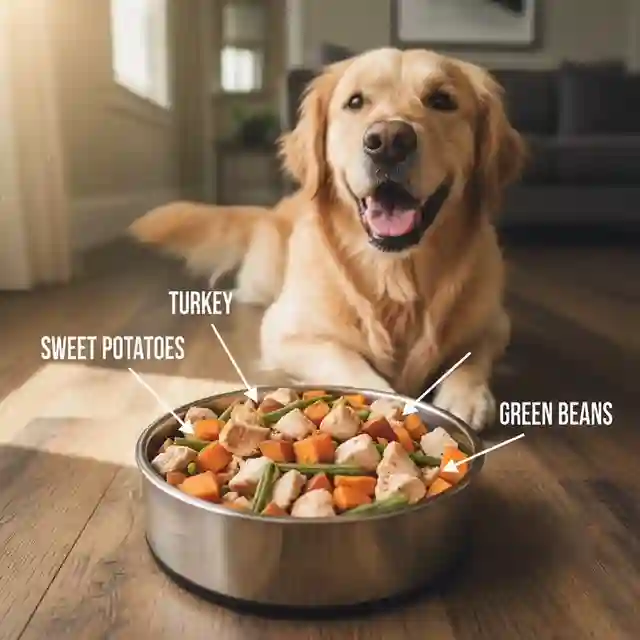Does your dog experience tummy troubles, frequent vomiting, loose stool, or excessive gas? If so, they may have a sensitive stomach—a surprisingly common issue for dogs of all breeds and ages. Choosing the best dog food for sensitive stomach is crucial for your pet’s comfort, long-term health, and happiness. In this detailed guide, discover what causes a sensitive stomach in dogs, expert tips for selecting the right food, recommended ingredients and brands, and practical advice to support your canine’s digestive wellness.
What Is a Sensitive Stomach in Dogs?
A sensitive stomach means a dog regularly has digestive upset—such as vomiting, diarrhea, gurgling noises, or appetite changes—often triggered by typical foods, rapid diet change, stress, or underlying health conditions. Senior dogs, puppies, and some breeds (like Bulldogs and German Shepherds) are especially prone to sensitive digestion.
Common Causes of Sensitive Stomach

Food Intolerances & Allergies: Common proteins (beef, chicken), grains (corn, wheat), or dairy can trigger symptoms.
– Low-Quality Ingredients: Fillers, by-products, and artificial additives may irritate the gut.
– Rapid Diet Changes: Sudden food switches disrupt the balance of gut bacteria, aggravating the condition.
– Underlying Health Issues: Pancreatitis, parasites, or inflammatory bowel disease may require a vet’s advice.
Signs Your Dog Needs Sensitive Stomach Food
– Chronic or recurrent vomiting
– Loose stools or diarrhea
– Frequent gas and bloating
– Poor appetite or nausea
– Dull coat, itching, or excessive licking
If you notice any of these, consult a veterinarian before switching foods. Rule out serious medical conditions first.
How to Choose the Best Dog Food for Sensitive Stomach
Selecting the right formula is both science and art. Consider these key factors:
1. High-Quality, Easily Digestible Proteins
Look for single-source, novel, or uncommon proteins such as lamb, duck, salmon, or venison. These are less likely to trigger allergic reactions.
– Chicken or Turkey: Lean options, but try an alternative if sensitivities are suspected.
– Fish or Salmon: Rich in omega fatty acids and gentle on digestion.
– Lamb or Venison: Excellent for dogs with poultry allergies.
2. Limited Ingredient Diets (LID)
LIDs feature a short list of whole, simple ingredients that minimize triggers. Ideal for ruling out specific allergies and intolerances.
3. Prebiotics & Probiotics Support
These gut-friendly additives encourage healthy intestinal flora, enhance digestion, and improve stool quality. Some premium brands add live probiotics directly to the kibble.
4. Gentle Carbohydrate Sources
5. High-Quality Fats
Sources such as fish oil deliver omega-3 and omega-6 fats, reducing inflammation and supporting skin/coat health.
6. Avoid These Ingredients
– Artificial colors, preservatives, and flavors (BHA, BHT)
– Rendered meats or by-products
– Dairy (for many dogs)
– High-fat content (without balancing fiber)
Top Recommended Dog Foods for Sensitive Stomach
Below are top vet-recommended formulas and customer favorites, tailored for various needs:
| Brand/Formula | Best For | Protein Source | Digestive Support | Unique Features |
|---|---|---|---|---|
| Hill’s Science Diet Sensitive Stomach & Skin | Adults & seniors | Chicken | Prebiotic fiber | Supports skin + coat |
| Purina Pro Plan Sensitive Skin & Stomach | Adults/all breeds | Salmon, Turkey | Probiotics, easy-to-digest carbs | Wakens appetite, joint support |
| Royal Canin Gastrointestinal Low-Fat | Dogs w/pancreatitis | Chicken | Low fat, balanced | Vet-prescribed for gut issues |
| Blue Buffalo True Solutions Blissful Belly | Digestive support | Chicken | Prebiotics, natural ingredients | Good for picky eaters |
| Blue Buffalo Basics Limited Ingredient | Grain-free | Turkey | Limited ingredients | Omega fats, pumpkin |
| Nature’s Recipe Easy to Digest | Budget-friendly | Lamb | Pumpkin, sweet potatoes | No by-products |
| Loyall Life Healthy Digestion | Gentle all-around | Chicken, rice | Prebiotics, pumpkin | Balanced for all ages |
| California Dog Kitchen Venison & Zucchini | Severe sensitivities | Venison | Novel protein, organic veggies | Small-batch, minimally processed |
Home-Cooked vs. Commercial Diets
Some owners cook their own limited ingredient diets (e.g., boiled chicken & rice) to soothe an upset stomach. While effective for short-term relief, commercial dog foods are formulated to deliver complete nutrition and maintain balance long-term. If you choose to home cook, work with a veterinarian or canine nutritionist to meet all essential nutrient needs.
Tips for Transitioning to Sensitive Stomach Food
– Switch foods gradually over 7–10 days, mixing increasing proportions of new food with old.
– Monitor stool quality, coat shine, and energy.
– Avoid giving table scraps or abruptly switching brands, as this can unsettle the gut.
Supporting Digestive Health Beyond Diet
– Provide constant access to clean water.
– Maintain a consistent feeding schedule—avoid irregular meals.
– Add fiber-rich foods like pumpkin or incorporate bone broth for natural soothing effects.
– Consider probiotics or digestive supplements if recommended by your vet.
Frequently Asked Questions
Can changing dog food too quickly cause stomach upset?
Yes. Always make changes slowly over at least a week to help gut bacteria adjust and minimize symptoms.
When should a veterinarian be consulted?
If persistent vomiting, bloody diarrhea, weight loss, or lethargy occur, consult your vet immediately. Chronic issues may indicate deeper health concerns.
Do “grain-free” diets help with a sensitive stomach?
Not always. Some dogs digest rice, oats, or barley easily. Unless your dog is allergic, whole grains are often beneficial.
Conclusion
Successfully managing sensitive stomachs in dogs depends on providing high-quality, easily digestible dog food for sensitive stomach, with a focus on novel proteins, prebiotics, limited ingredients, and gut-friendly nutrients. Leading formulas like Hill’s Science Diet Sensitive Stomach, Purina Pro Plan Sensitive Skin and Stomach, or limited ingredient blends from Blue Buffalo and California Dog Kitchen offer tailored solutions for every canine. Always consult your veterinarian and introduce any new food gradually. Keeping your pet’s digestive health in check is the first step to a happier, healthier life for your best friend.
Disclosure: This content is reader-supported, as an Amazon Associate, we earn from qualifying purchases.
Reference: akc.org










